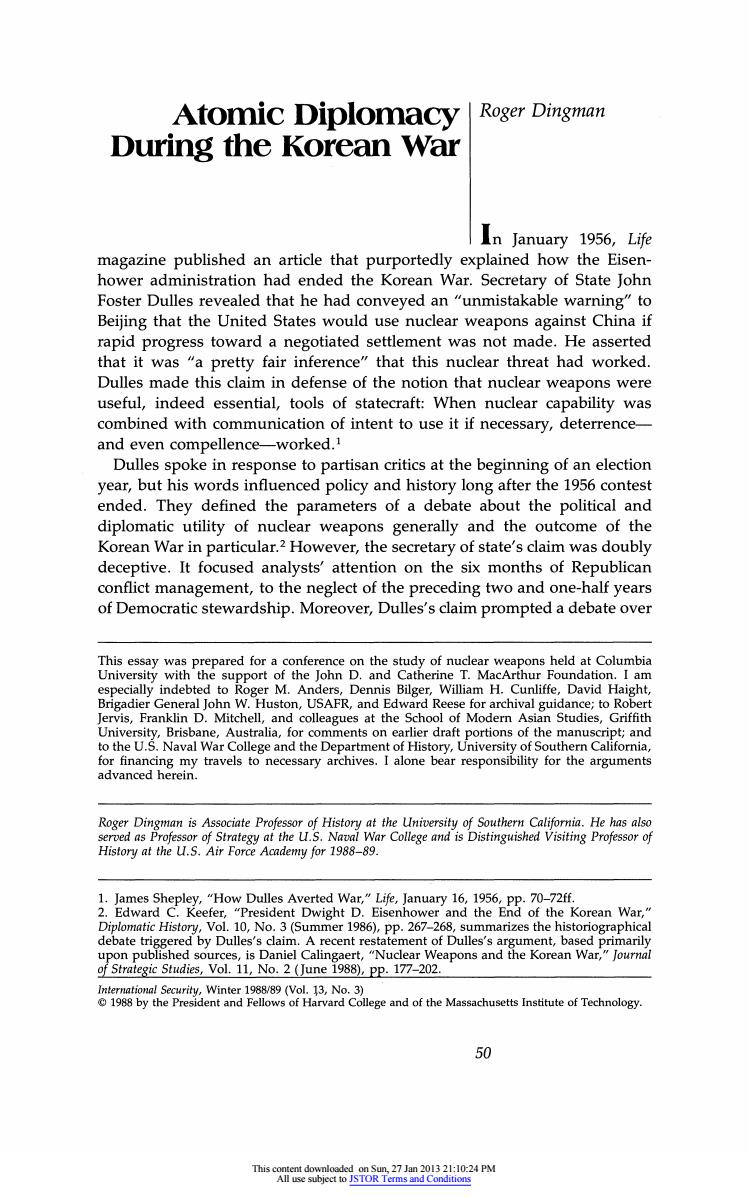正在加载图片...

Atomic Diplomacy Roger Dingman During the Korean War In January 1956,Life magazine published an article that purportedly explained how the Eisen- hower administration had ended the Korean War.Secretary of State John Foster Dulles revealed that he had conveyed an "unmistakable warning"to Beijing that the United States would use nuclear weapons against China if rapid progress toward a negotiated settlement was not made.He asserted that it was "a pretty fair inference"that this nuclear threat had worked. Dulles made this claim in defense of the notion that nuclear weapons were useful,indeed essential,tools of statecraft:When nuclear capability was combined with communication of intent to use it if necessary,deterrence- and even compellence-worked.1 Dulles spoke in response to partisan critics at the beginning of an election year,but his words influenced policy and history long after the 1956 contest ended.They defined the parameters of a debate about the political and diplomatic utility of nuclear weapons generally and the outcome of the Korean War in particular.2 However,the secretary of state's claim was doubly deceptive.It focused analysts'attention on the six months of Republican conflict management,to the neglect of the preceding two and one-half years of Democratic stewardship.Moreover,Dulles's claim prompted a debate over This essay was prepared for a conference on the study of nuclear weapons held at Columbia University with the support of the John D.and Catherine T.MacArthur Foundation.I am especially indebted to Roger M.Anders,Dennis Bilger,William H.Cunliffe,David Haight, Brigadier General John W.Huston,USAFR,and Edward Reese for archival guidance;to Robert Jervis,Franklin D.Mitchell,and colleagues at the School of Modern Asian Studies,Griffith University,Brisbane,Australia,for comments on earlier draft portions of the manuscript;and to the U.S.Naval War College and the Department of History,University of Southern California, for financing my travels to necessary archives.I alone bear responsibility for the arguments advanced herein Roger Dingman is Associate Professor of History at the University of Southern California.He has also served as Professor of Strategy at the U.S.Naval War College and is Distinguished Visiting Professor of History at the U.S.Air Force Academy for 1988-89. 1.James Shepley,"How Dulles Averted War,"Life,January 16,1956,pp.70-72ff. 2.Edward C.Keefer,"President Dwight D.Eisenhower and the End of the Korean War," Diplomatic History,Vol.10,No.3(Summer 1986),pp.267-268,summarizes the historiographical debate triggered by Dulles's claim.A recent restatement of Dulles's argument,based primarily upon published sources,is Daniel Calingaert,"Nuclear Weapons and the Korean War,"Journal of Strategic Studies,Vol.11,No.2 (June 1988),pp.177-202. International Security,Winter 1988/89 (Vol.13,No.3) 1988 by the President and Fellows of Harvard College and of the Massachusetts Institute of Technology. 50 This content downloaded on Sun,27 Jan 2013 21:10:24 PM All use subject to JSTOR Terms and ConditionsAtOmiC Diplomacy Roger Dingman During the Korean War In January 1956, Life magazine published an article that purportedly explained how the Eisenhower administration had ended the Korean War. Secretary of State John Foster Dulles revealed that he had conveyed an "unmistakable warning" to Beijing that the United States would use nuclear weapons against China if rapid progress toward a negotiated settlement was not made. He asserted that it was "a pretty fair inference" that this nuclear threat had worked. Dulles made this claim in defense of the notion that nuclear weapons were useful, indeed essential, tools of statecraft: When nuclear capability was combined with communication of intent to use it if necessary, deterrenceand even compellence-worked.1 Dulles spoke in response to partisan critics at the beginning of an election year, but his words influenced policy and history long after the 1956 contest ended. They defined the parameters of a debate about the political and diplomatic utility of nuclear weapons generally and the outcome of the Korean War in particular.2 However, the secretary of state's claim was doubly deceptive. It focused analysts' attention on the six months of Republican conflict management, to the neglect of the preceding two and one-half years of Democratic stewardship. Moreover, Dulles's claim prompted a debate over This essay was prepared for a conference on the study of nuclear weapons held at Columbia University with the support of the John D. and Catherine T. MacArthur Foundation. I am especially indebted to Roger M. Anders, Dennis Bilger, William H. Cunliffe, David Haight, Brigadier General John W. Huston, USAFR, and Edward Reese for archival guidance; to Robert Jervis, Franklin D. Mitchell, and colleagues at the School of Modern Asian Studies, Griffith University, Brisbane, Australia, for comments on earlier draft portions of the manuscript; and to the U.S. Naval War College and the Department of History, University of Southern California, for financing my travels to necessary archives. I alone bear responsibility for the arguments advanced herein. Roger Dingman is Associate Professor of History at the University of Southern California. He has also served as Professor of Strategy at the U.S. Naval War College and is Distinguished Visiting Professor of History at the U.S. Air Force Academy for 1988-89. 1. James Shepley, "How Dulles Averted War," Life, January 16, 1956, pp. 70-72ff. 2. Edward C. Keefer, "President Dwight D. Eisenhower and the End of the Korean War," Diplomatic History, Vol. 10, No. 3 (Summer 1986), pp. 267-268, summarizes the historiographical debate triggered by Dulles's claim. A recent restatement of Dulles's argument, based primarily upon published sources, is Daniel Calingaert, "Nuclear Weapons and the Korean War," Journal of Strategic Studies, Vol. 11, No. 2 (June 1988), pp. 177-202. International Security, Winter 1988/89 (Vol. 43, No. 3) ? 1988 by the President and Fellows of Harvard College and of the Massachusetts Institute of Technology. 50 This content downloaded on Sun, 27 Jan 2013 21:10:24 PM All use subject to JSTOR Terms and Conditions